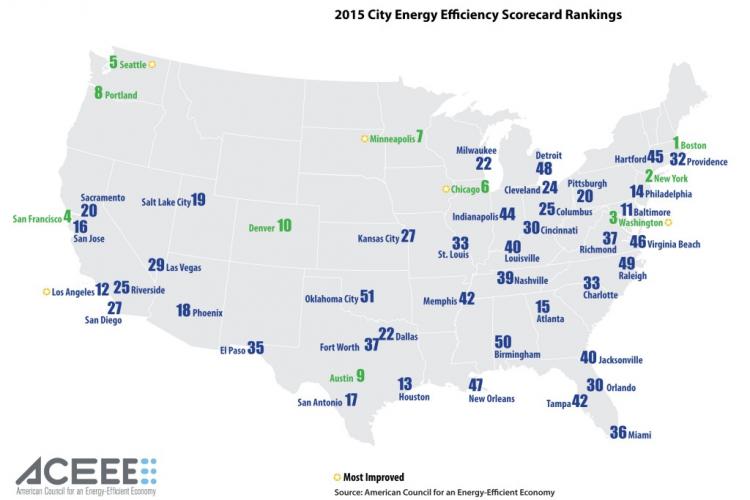
On Wednesday, the American Council for an Energy Efficient Economy (ACEEE) released its 2015 City Scorecard, which ranks the energy efficiency of 51 large American cities in five program and policy areas –local government operations, community-wide initiatives, buildings, energy and water utilities and transportation.
While Boston once again took first place in this biennial report, Chicago and Minneapolis led the way in the Midwest, both earning slots in the top ten, coming in at numbers six and seven, respectively. Both cities also earned the “Most Improved” designation from ACEEE.
Kansas City, where MEEA supported the development of updated energy codes specifically commended by the report, was ranked 27th. MEEA has also been active in Chicago and Minneapolis, supporting statewide code development processes in each.
Other Midwestern cities ranked in the report include Milwaukee, Cleveland, Columbus, Cincinnati, St. Louis, Louisville, Indianapolis and Detroit. And with the adoption of updated residential codes slated to take effect in early 2016, Detroit has shown a commitment to efficiency that should be reflected in future ratings.
Lawrence, Kansas, Dubuque, Iowa and Madison, Wisconsin, while not officially ranked by ACEEE, performed self-evaluations using ACEEE’s Self-Scoring Tool. Madison’s impressive score would have earned it a spot at number 11 on the list.
These rankings are not just about past achievements (or even a little healthy competition). ACEEE offers concrete ways to increase energy savings by highlighting best practices and areas needing improvement in each city. Minneapolis, for example, was praised for its “investment in (and savings from) electric and natural gas utility efficiency programs”—efforts involving MEEA members CenterPoint Energy and Xcel Energy. The report did, however, suggest Minneapolis could improve by extending energy code benchmarking to include multifamily buildings.
“Overall, we found that cities are still laboratories of innovation, pushing the envelope to reduce energy waste,” said the report’s lead author David Ribeiro. “By capturing these efforts in the Scorecard we hope local leaders from cities of all sizes can learn best practices from each other and deliver the benefits of energy efficiency to their communities, such as a stronger economy and a cleaner environment.”
With innovation, investment and commitment to energy efficiency, Midwestern cities can continue to create more energy efficient communities and climb the ACEEE rankings. Look out, Boston—2017 is our year!